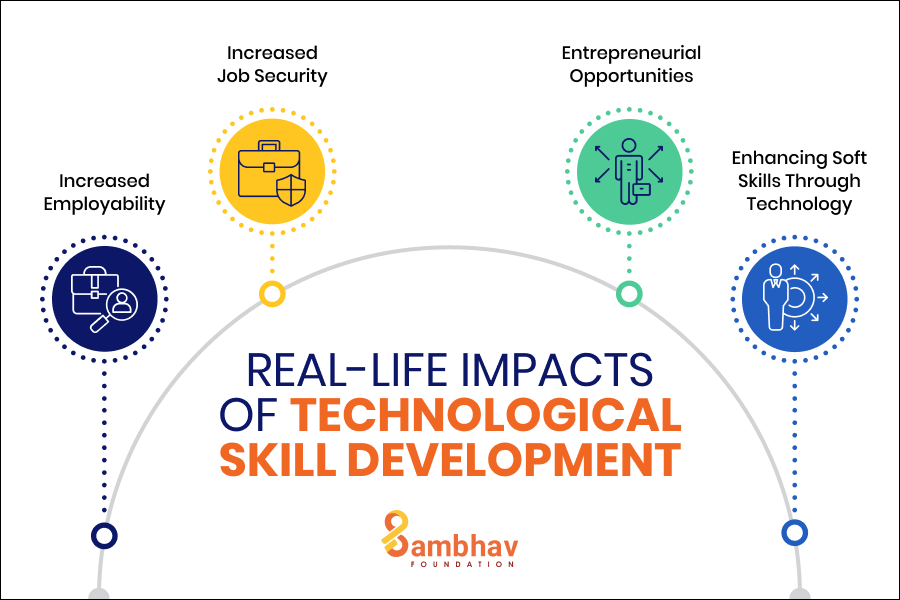Youth Skill Development
The rapid evolution of the job market has created an increasing demand for specialized skills, many of which are not covered by traditional education systems. Consequently, the focus has shifted towards skill development as a critical factor in youth employment. Technological advancements have played a pivotal role in shaping modern skill development, democratizing access to valuable training and thus, accelerating youth empowerment.
This blog explores how technology is playing a transformative role in youth skill development. So, why is skill development important for youth employment? Let’s dive in to find out.
The Importance of Skill Development in Youth Employment
The Skill Gap in Today’s Labor Market
The evolving nature of job roles and industries has led to a mismatch between the skills job seekers possess and what employers actually require. This is often referred to as the ‘skill gap,’ and it is particularly pertinent for young individuals entering the workforce. Addressing the importance of skill development in youth is therefore a pressing need.
Why Skill Development is Important for Youth Employment?
Skill development acts as a bridge between academic qualifications and real-world job requirements. It equips young individuals with the tools they need to navigate a constantly changing labor market successfully. With specialized training, youth are more adaptable and equipped to meet diverse job requirements, thereby standing out in the competitive job market.
The Interplay Between Education and Employability
While traditional education provides a solid foundation, it often lacks the technical and soft skills necessary for today’s job roles. Skill development complements academic knowledge, turning young individuals into holistic professionals ready for modern challenges.
Technological Advancements in Skill Development
e-Learning and Online Courses
The dawn of e-Learning platforms and online courses has made youth skill development programs more accessible than ever. Whether it’s coding, digital marketing, or project management, young individuals can now acquire vital skills from the comfort of their homes.
Virtual Reality (VR) and Augmented Reality (AR) in Training
Virtual and augmented reality technologies are revolutionizing the youth empowerment program landscape by providing immersive, real-world training simulations. These technologies make learning more interactive and engaging, significantly improving skill retention.
Artificial Intelligence in Personalized Learning
AI technologies can tailor educational experiences to match an individual’s learning pace, style, and preferences. This customization plays a vital role in youth empowerment, enabling a more focused and effective learning experience.

Real-life Impacts of Technological Skill Development
Increased Employability and Job Security
A youth empowerment program that is technology-oriented not only teaches hard skills but also instills a mindset of adaptability and lifelong learning, leading to better job prospects and security.
Entrepreneurial Opportunities
Technological skills also open the door for entrepreneurial ventures. With the right skill set, youth can transition from job-seekers to job-creators.
Enhancing Soft Skills Through Technology
Believe it or not, technology can also enhance soft skills. Platforms that simulate real-world environments, for example, can help improve communication, teamwork, and problem-solving skills.
How Can CSR Professionals and HNIs Contribute?
Financial Contributions
Investing in technology-driven youth empowerment programs can significantly scale the impact, allowing more individuals to gain valuable skills. Your financial contributions serve as a catalyst for change.
Intellectual Contributions
Expertise and mentorship can make a world of difference in a youth skill development program. Through workshops, webinars, and one-on-one sessions, CSR professionals and HNIs can share valuable insights and guidance.
Advocacy and Volunteering
Beyond financial and intellectual contributions, advocacy plays a crucial role. Spreading the word about these programs can attract more participants and funding, amplifying the impact exponentially.
Why Technology-Driven Skill Development is a Win-Win for Youth and CSR Professionals Alike
The landscape of employment is shifting, and skill development is at its core. Technological advancements have the potential to significantly bridge the employability gap among youth. For CSR professionals and High Net Worth Individuals, the opportunities to make a meaningful impact are abundant and rewarding.
By investing in technology-driven skill development programs, like those offered by Sambhav Foundation, you’re not just fueling individual growth but contributing to a more skilled and employable future generation.
Frequently Asked Questions (FAQs)
What Specific Technologies are Making the Most Impact in Skill Development?
Online platforms, Virtual Reality (VR), Augmented Reality (AR), and Artificial Intelligence (AI) are at the forefront of technology-driven skill development. These technologies provide interactive, real-world simulation and personalized learning experiences that are immensely beneficial for youth empowerment.
How Can CSR Professionals Specifically Contribute to Technology-Driven Skill Development?
CSR professionals can contribute through financial backing, which is the most direct form of support. Additionally, they can offer mentorship, expertise, or even technological resources to make these programs more effective and scalable.
What Metrics Can Be Used to Measure the Success of a Youth Skill Development Program?
Key Performance Indicators (KPIs) such as completion rates, skill assessment scores, job placement rates, and feedback from both employers and participants are effective metrics for evaluating the success of a youth skill development program.
Are There Any Pre-requisites for Youth to Enroll in These Technology-Driven Programs?
The prerequisites vary depending on the program. However, most technology-driven skill development programs are designed to be inclusive, requiring minimal pre-existing knowledge so that they are accessible to a broad audience.
Can Technology Also Help in Developing Soft Skills?
Absolutely, technology isn’t just for hard skills like coding or data analysis. Platforms that offer real-world simulations, role-playing, or interactive lessons can also significantly improve soft skills like communication, teamwork, and problem-solving.




